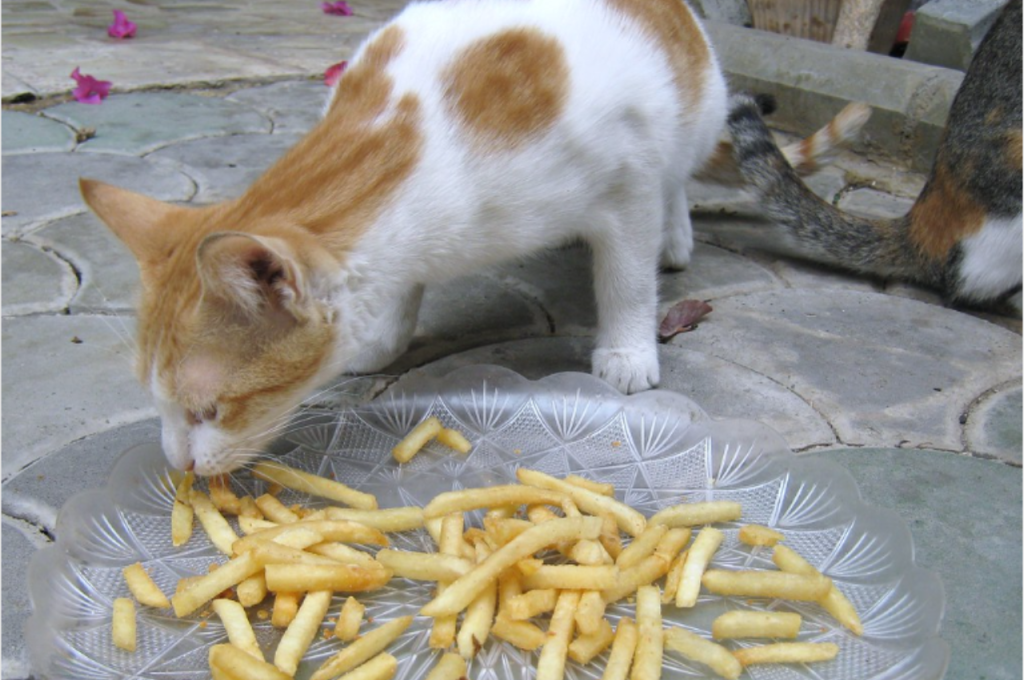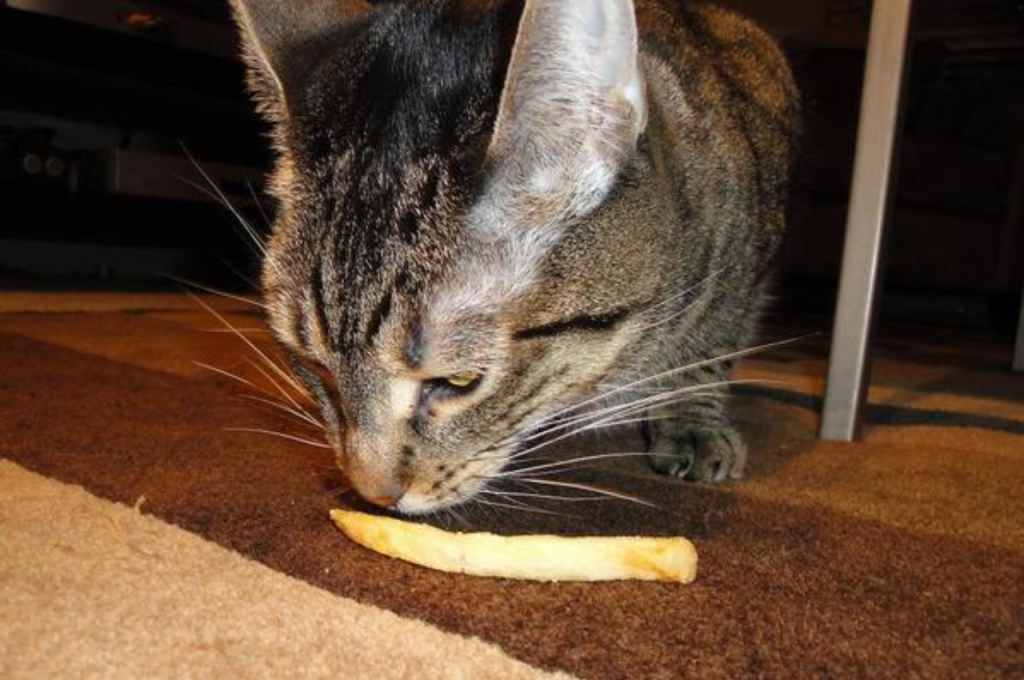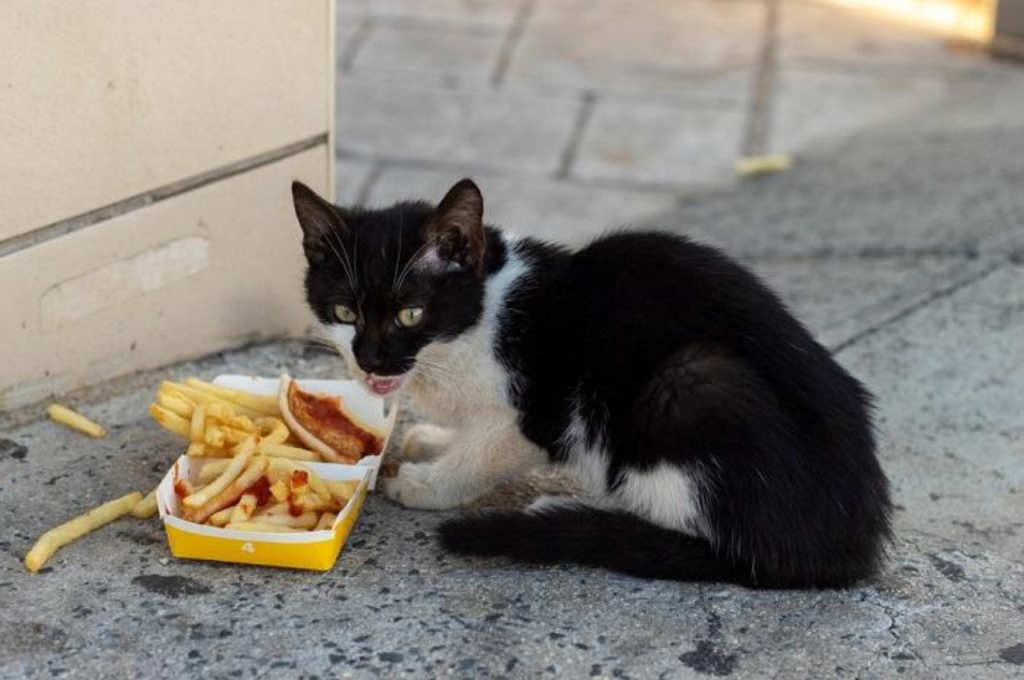Cats should not eat fries as they are unhealthy and offer no nutritional value. Fries can lead to digestive issues in cats.
While many cats may show interest in human foods, it’s essential to be cautious about what they consume. Cats have specific dietary requirements, and feeding them inappropriate foods like fries can have detrimental effects on their health. We will delve into the reasons why cats should avoid fries and provide alternative, safe treats for your feline friend.
Understanding what foods are safe for your cat is crucial for their well-being and longevity. Let’s explore the importance of feeding your cat a balanced and species-appropriate diet to keep them healthy and happy.
The Relationship Between Cats and Fries
Cats should not eat fries as they provide little to no nutritional value to the feline diet. The high salt and fat content in fries can be harmful to a cat’s health, potentially leading to digestive issues and obesity.

It’s best to stick to a balanced diet specifically formulated for cats.
The relationship between cats and fries is a topic that many cat owners ponder. Cats’ Dietary Needs are unique, requiring a balance of protein and nutrients. Fries may not meet these needs and can have a potential Impact of Fries on Cats. Let’s explore this further below.
Cats’ Dietary Needs
Cats have specific dietary requirements, needing high levels of protein and essential nutrients for optimal health.
- Protein is crucial for a cat’s muscle development and overall well-being.
- Key nutrients like taurine are essential for feline heart health.
- A balanced cat diet should consist of meat-based proteins and vitamins.
Impact of Fries on Cats
Fries, while appealing to many humans, may not be suitable for cats due to their nutritional content.
- High in salt and fat, fries can lead to digestive issues for cats.
- Potatoes in fries are not a natural part of a cat’s diet and may cause stomach upset.
- Consumption of fries can lead to obesity in cats, impacting their overall health.
Risks and Concerns
When it comes to feeding human food to our feline friends, it’s important to be aware of the risks and concerns involved. While cats are obligate carnivores and thrive on a diet rich in meat, they may show curiosity towards our food, including fries. However, it’s crucial to understand that certain human foods may pose health risks to cats if consumed regularly or in large quantities. In this article, we will explore the potential risks and concerns of feeding fries to your furry companion.
Digestive Issues
Feeding fries to your cat can lead to various digestive issues due to the composition and preparation of this popular side dish. Fries are often deep-fried in oil and seasoned with salt or other spices. The high-fat content and added seasonings can upset your cat’s delicate digestive system, potentially leading to stomach upset, diarrhea, or vomiting. Additionally, the high salt content in fries can disrupt the balance of electrolytes in your cat’s body, leading to dehydration or other health complications.
Obesity Risk
Obesity is a growing concern among cats, with excessive weight gain leading to various health problems. Feeding fries to your cat, even in small amounts, can contribute to the risk of obesity. Fries are typically high in calories and fat, which can quickly add up and lead to weight gain. Just a few pieces of fries may seem insignificant, but when given as a treat or snack regularly, the calorie count can accumulate over time. It’s important to remember that cats have specific dietary requirements and need a balanced diet to maintain optimal health.
While it can be tempting to share our favorite snacks with our cats, it’s crucial to prioritize their health and well-being. Instead of offering fries as a treat, consider providing your cat with appropriate cat-friendly treats or sticking to their regular diet. If you’re looking for alternative ways to engage and bond with your furry friend, consider interactive play sessions or providing them with cat-safe toys. By keeping your cat’s diet balanced and avoiding potentially harmful food items, you can ensure their long-term health and happiness.
Expert Recommendations
When it comes to the question of whether cats can eat fries, it’s important to consider expert recommendations. As much as cats may express interest in nibbling on your plate of fries, it’s essential to understand the potential risks and healthy alternatives for our feline companions.
Veterinarians’ Advice
Cats should not consume fries as they are high in fat, and salt, and often contain seasonings that may be harmful to their digestive system. Feline veterinary specialists emphasize the importance of maintaining a balanced and species-appropriate diet to ensure the well-being of your cat.
Healthy Alternatives
Instead of fries, there are healthier options that you can offer to your cat as an occasional treat. Consider giving them small portions of cooked, unseasoned meat or fish, limited amounts of certain fruits and vegetables, or specially formulated cat treats designed to meet their dietary needs.
Understanding Cats’ Behavior
Cats are fascinating creatures with unique behaviors that often leave their owners puzzled. Understanding cats’ behavior, especially when it comes to their food preferences, can help pet owners make informed decisions about what to feed their feline companions. In this blog post, we delve into the curious nature of cats and explore whether they can eat fries.

Curiosity and Exploration
Cats are naturally curious animals. They love to explore their surroundings, and anything new or unfamiliar is likely to pique their interest. This curiosity extends to the food they encounter, which might lead them to investigate unusual items such as fries. However, cat owners need to be mindful of the potential risks associated with allowing their feline friends to indulge in human foods.
Food Preferences
Cats have specific dietary needs, and their food preferences are influenced by various factors, including their instinct as obligate carnivores. While cats may show an interest in human food like fries, it’s crucial to remember that their bodies have evolved to thrive on a diet primarily composed of animal proteins. Therefore, indulging in non-nutritious treats like fries can lead to potential health issues for cats, such as obesity and digestive problems.
Recognizing Signs of Distress
Cats are curious creatures, and they may try to sneak a bite of your fries when you’re not looking. However, it’s important to be aware of the potential risks. Recognizing signs of distress in cats is crucial to ensure their well-being. Let’s look at some vital signs that indicate your cat may be experiencing discomfort after consuming fries.
Changes in Behavior
Cats may display changes in behavior if they are distressed after consuming fries. Watch out for any signs of restlessness, agitation, or excessive meowing. They might also show disinterest in their usual activities or display signs of irritability towards humans or other pets in the household.
Physical Symptoms
- Check for signs of gastrointestinal distress such as vomiting, diarrhea, or constipation. These can be clear indicators that fries have caused discomfort to your cat’s digestive system.
- Observe if your cat is experiencing bloating or abdominal discomfort. This can be evident through their posture and a palpable tenderness in their belly area.
- Look for any abnormal changes in their litter box habits or urine output, as this could indicate potential urinary problems caused by consuming fries.
It’s essential to monitor your cat closely for these physical symptoms to ensure early detection of any distress. Seeking prompt veterinary care is crucial if you notice any of these signs.
Training and Prevention
Training and prevention strategies play crucial roles in maintaining the health and well-being of our feline companions. From behavioral training to preventive healthcare measures, there are various steps that cat owners can take to ensure their cats lead happy and healthy lives.
- Offer nutritious treats for cats like small pieces of cooked meats or veggies.
- Encourage regular feeding times to establish a healthy routine.
- Ensure your cat has access to fresh water at all times.
Avoiding Access to Harmful Foods
- Store harmful foods like fries in secure containers or high places.
- Educate family members on what not to feed your feline friend.
- Never leave potentially dangerous foods within your cat’s reach.
Healthy Diet for Cats
Ensuring your cat receives a well-rounded diet is essential for maintaining their health and vitality. This includes providing a balanced combination of proteins, carbohydrates, fats, vitamins, and minerals.
Balanced Nutrition
Cats require essential nutrients for their overall well-being.
- Proteins are crucial for muscle development and repair.
- Fats provide energy and support healthy skin and coat.
- Carbohydrates contribute to energy levels in cats.
Importance of Water
Cats need access to fresh water at all times to prevent dehydration.
- Water aids in digestion and regulates body temperature.
- Dehydration can lead to serious health issues in cats.
- Encourage your cat to drink water regularly throughout the day.
Avoid feeding cats fries as they are high in salt and unhealthy fats.
Importance of Consultation
Cats are curious creatures, and it’s not uncommon for them to show interest in our food. As a responsible cat owner, it’s essential to be aware of what foods are safe for your feline friend. In this article, we’ll explore whether cats can eat fries and discuss the importance of consultation before introducing any new foods to your cat’s diet.
Regular Vet Check-ups
Regular veterinary check-ups are crucial for the health and well-being of your cat. During these visits, your veterinarian can assess your cat’s overall health and address any concerns you may have. They can provide valuable insights into your cat’s dietary needs and offer guidance on what foods are safe for them to consume. It’s important to consult your vet before introducing fries or any other human foods into your cat’s diet.
Customized Dietary Plans
Cats have unique dietary requirements that vary depending on their age, weight, health condition, and activity level. A customized dietary plan is crucial to ensure your cat receives all the essential nutrients they need for optimal health. Consulting with your veterinarian allows you to create a tailored diet for your cat, taking into account their specific needs and any potential allergies or sensitivities they may have. This way, you can ensure that your feline friend gets the right balance of nutrients and avoid any potential harm from food items like fries.

Consulting with your veterinarian is crucial when it comes to determining what foods are safe for your cat. While fries may be tempting to share with your furry companion, it’s important to consider the potential risks they pose. Cats have different digestive systems than humans, and their bodies may not tolerate certain foods in the same way. Some oils, seasonings, or additives commonly found in fries can be detrimental to cats’ health and may lead to gastrointestinal concerns such as vomiting, diarrhea, or even pancreatitis.
Remember, your veterinarian is the best resource for ensuring your cat’s nutritional needs are met. They can provide expert advice tailored to your cat’s unique circumstances, offering alternative treats or snacks that will not compromise their health. It’s always better to be safe than sorry when it comes to your feline friend’s well-being.
Conclusion
To sum it up, feeding cats fries is not advisable due to their potentially harmful ingredients like salt and oil. Cats have specific dietary needs that are best met with a balanced and species-appropriate diet. Instead, offer them healthier options such as lean meat or specially formulated cat treats.
Prioritizing your cat’s health and well-being can help ensure a long and happy life for your feline friend.
